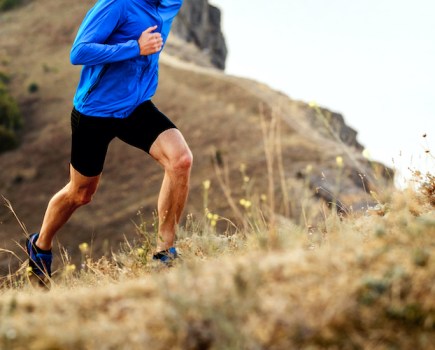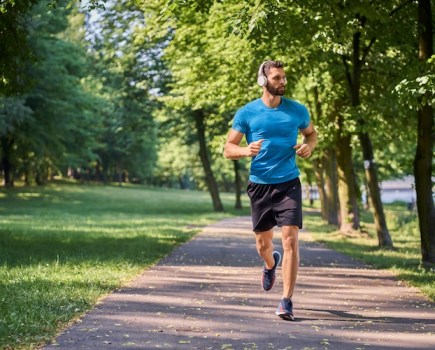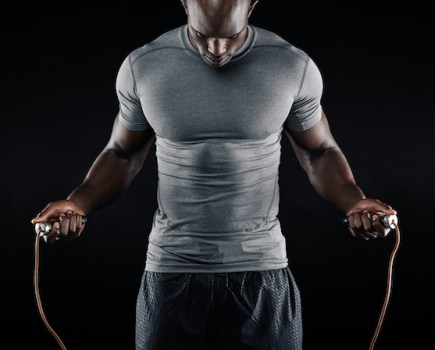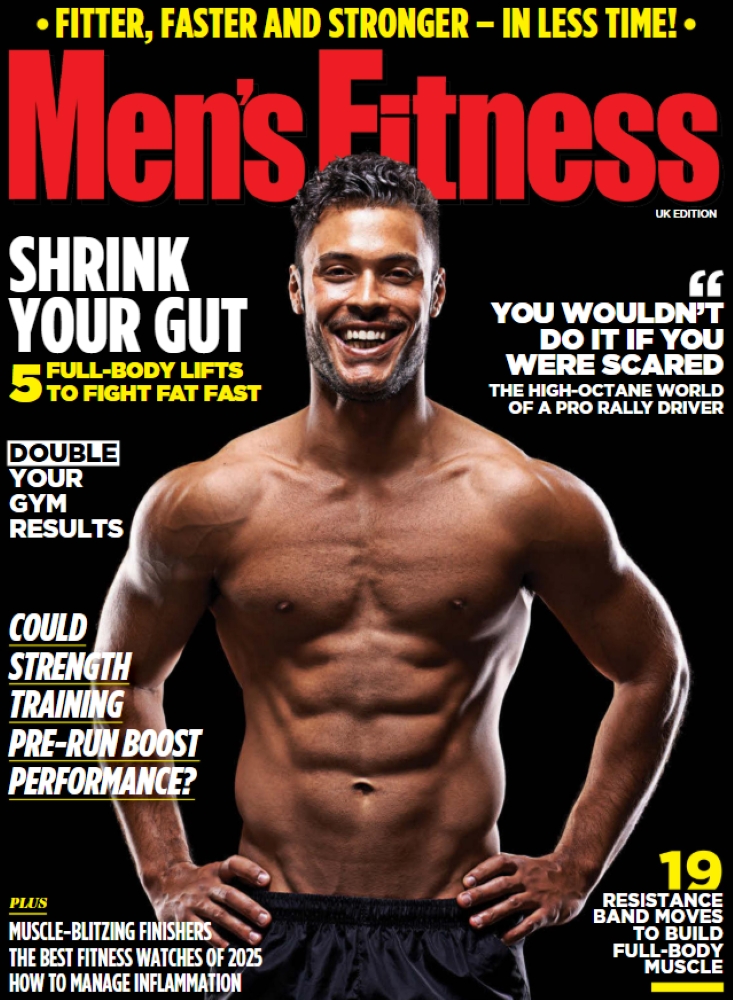Whatever your favorite distance, these are the best running shoes for the kind of running you do.
When it comes to upping the mileage or smashing your PBs as you progress as a runner, donning a pair of the best running shoes can make a huge difference. Alongside keeping your feet comfortable while pounding the pavements or hitting the trails, modern trainers also offer a range of features to enhance your stride, every step of the way.
To help you put your best foot forward, we put a selection of the latest running shoes through their paces – here’s the cream of the crop.
These are the best running shoes you can buy in 2025
Running shoes mean different things to different people, but one thing our testers could all agree on was the Nike Vaporfly 3 is a fantastic shoe, and the best for fast runners. That doesn’t necessarily mean racers though; anyone looking to improve their running could benefit from Nike’s carbon super shoe. Whether that’s looking for pacier parkruns or chasing longer distance PBs, you’ll feel a better and faster runner in these shoes.
Other running shoe recommendations
| Best running shoes for neutral runners | If you’re looking for a comfortable cruising shoe, look no further than the Brooks Ghost Max. DNA Loft V2 cushioning and a GlideRoll rocker combine to create a super-comfy ride that still has a spring in its step. |
| Best running shoes for maximum cushioning | The best max-cushioned shoe we’ve tested is the ASICS Novablast 4, which is a daily trainer that packs an impressive amount of punch. It’s surprisingly responsive for a big shoe. |
| Best running shoes for overpronators | Brooks’ Adrenaline line has been going for decades, and the Brooks Adrenaline GTS 23 takes its stability for overpronators to new heights, with its unique GuardRail to help you keep your form as you tire. |
| Best running shoes for off-road trails | The inov-8 Trailfly G 270 V2 shoe is a great off-road all-rounder, with enough cushioning to help you clock up the miles in comfort with good grip and propulsion on most surfaces. |
Why you can trust Men’s Fitness
We spend hours testing every product or service we review, so you can be sure you’re buying the best. Our team of reviewers includes experienced product testers, PTs and fitness writers – as well as the core MF team – who know exactly what sets the best products apart from the rest. Find out more about how we test.
1. Nike Vaporfly 3
Best overall
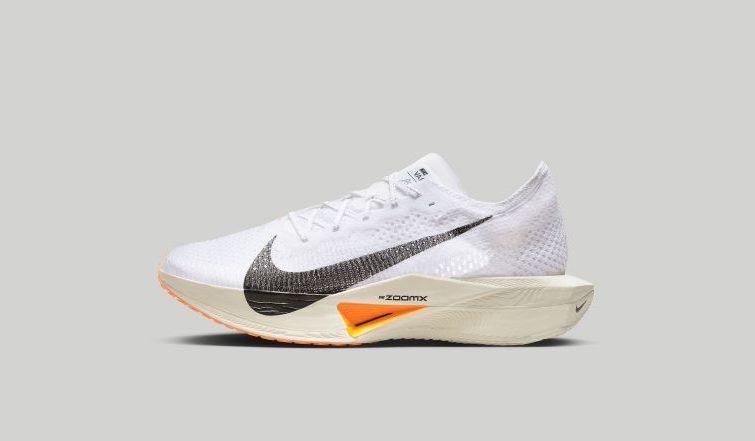
Men’s Fitness verdict
We’d have forgiven Nike for making a carbon copy of its excellent v2 super shoe. Instead it’s made refinements that may divide opinion but there’s no doubting the racing pedigree of the Vaporfly 3.- Light, punchy and energetic
- Softer midsole for more protection
- Lost some stiffness
- Less secure fit
| Materials | ZoomX foam; carbon fibre flyplate |
| Weight | 6.9oz / 195g |
| Colors | White & particle grey / sail & orange |
The Nike Vaporfly 3 maintains its lightweight design, combining a carbon plate with Nike ZoomX foam, but with notable changes. More ZoomX foam in the midsole, along with a redesigned heel and improved midfoot stability, enhance the shoe’s performance. The new Flyknit uppers are lighter and more breathable, while the outsole features a thinner rubber covering with a waffle design for improved grip.
It’s the lightest carbon shoe available, and despite retaining a 40mm/32mm stack height, it offers a more stable platform. In testing over 50 miles, including a marathon, it performed exceptionally well, providing cushioned protection but with a slightly softer ride compared to the Vaporfly 2. While it’s still agile and fun, offering better breathability, it sacrifices some race-focused responsiveness for versatility and comfort. Overall, the Vaporfly 3 is a great option for various distances, offering improved stability and protection.
- Read our full Nike Vaporfly 3 review
2. Brooks Adrenaline GTS 23
Best for overpronators
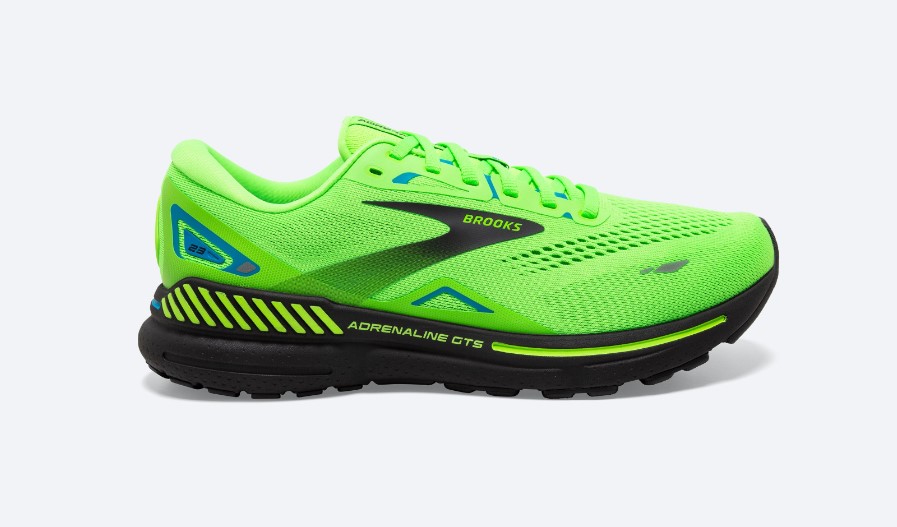
Men’s Fitness verdict
If you’re an overpronator looking for a reliable stability shoe for mixed daily training, we can recommend the GTS 23. It’s not quite light or sprightly enough for regular high tempo efforts though.- Well balanced
- GuardRail gives support to overpronators
- Four widths to choose from
- A little too heavy for pacey runs
| Materials | 60% recycled materials |
| Weight | 286g / 10.1oz |
| Colors | Peacoat / green gecko / black & Hawaiian / black & ebony / blue |
The Brooks Adrenaline GTS 23 offers significant updates from its predecessor, focusing on stability and comfort. It replaces the old firm rubber insert with a guide rail around the midsole, promoting proper foot spreading and strengthening. This design aids overpronators by encouraging a more balanced push-off. The shoe’s balanced feel and subtle cushioning, especially under the forefoot, promote correct running form for various paces and distances.
Compared to the GTS 22, it features a slightly softer DNA LOFT v2 midsole and a wider forefoot for a plush yet responsive ride. Weighing just over 10oz, it’s suitable for everyday training, offering comfort and reliability. With approximately 60% recycled materials in the uppers and various width options, it’s a solid choice for stability-seeking runners, especially at its price point.
- Read our full Brook Adrenaline GTS 23 review
3. Brooks Ghost Max
Best for neutral runners
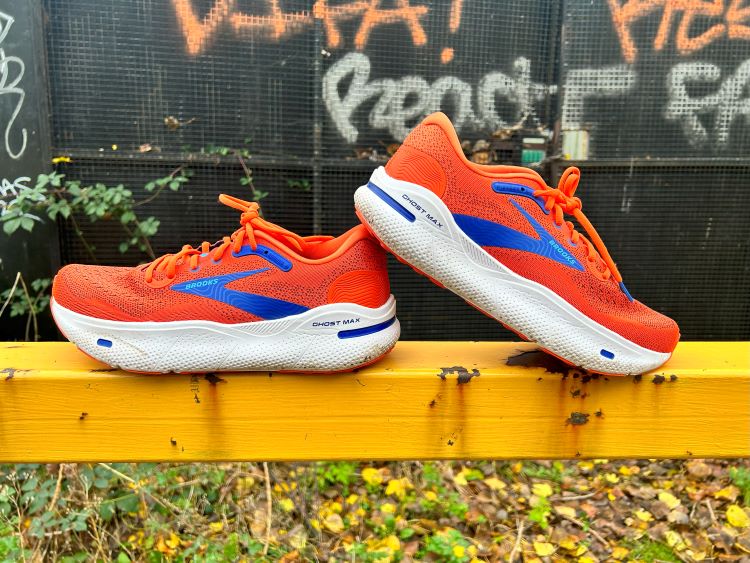
Men’s Fitness verdict
The Ghost Max has real comfortable cruiser credentials with a consistent, stable ride, but there’s not quite enough pop when you want to pick up the pace.- Comfortable fit
- Mild but well rockered ride
- Good stability
- Midsole foam is a little dull
- Not one for tempo work
- Could be lighter
| Materials | DNA Loft V2; 56.4% recycled uppers |
| Weight | 283.5g / 10oz |
| Colors | Red orange / crown blue / black / black & atomic blue |
The Brooks Ghost Max, similar to the Ghost and Glycerin 20, offers a good blend of comfort and performance. Available in two width options, we found it suits narrow feet well, with ample space in the toe box and no heel slippage issues. Featuring a higher stack of DNA Loft v2 cushioning compared to the Ghost 15, it provides a stable and protective platform, enhanced by the GlideRoll Rocker for smooth transitions.
While we thought the cushioning may feel slightly dull compared to the Glycerin 20’s livelier foam, the Ghost Max excels in easy-paced runs, offering a smooth and consistent ride. However, it may lack responsiveness for faster runs. It offers reliable grip on various terrains, making it suitable for most runners’ needs.
- Read our full Brooks Ghost Max review
4. ASICS Metaspeed Edge Paris
Best for high-tempo running

Men’s Fitness verdict
A lightweight running shoe for when you want to go faster, but its speedy counterpart the Metaspeed Sky Paris is the better of ASICS’ two racing shoes.- Bouncy, lively feeling at faster paces
- Lightweight design
- Offers good protection
- Outsole may not be the most rugged
- A touch firmer than the Metaspeed Sky Paris
- Slightly unstable when legs tire
| Materials | Mesh Motion Wrap 2.0 upper; PEBA-based FF Blast Turbo+ foam; ASICSGRIP rubber outsole |
| Weight | 179g / 6.3oz (UK men’s size 8) |
| Colors | Orange / safety yellow & black |
| Sizes | 2.5 – 12 |
The Metaspeed Edge Paris is up there with the Sky Paris in terms of ASICS’ lightweight offerings for pacey runners of all distances. Snug-fitting Mesh Motion Wrap 2.0 uppers, responsive FF Blast Turbo+ foam and minimal ASICSGRIP outsoles combine to make a snappy, sub-180g race shoe. Its scooped carbon plate gives a quite aggressively rockered ride, but there’s also a surprising amount of protection built in to stop your legs being battered by those longer efforts. If you’re a high-tempo cadence runner looking for a light but sprightly ride, the Edge Paris could be right up your street.
- Read our full ASICS Metaspeed Edge Paris review
5. ASICS Novablast 5
Best for cushioned comfort
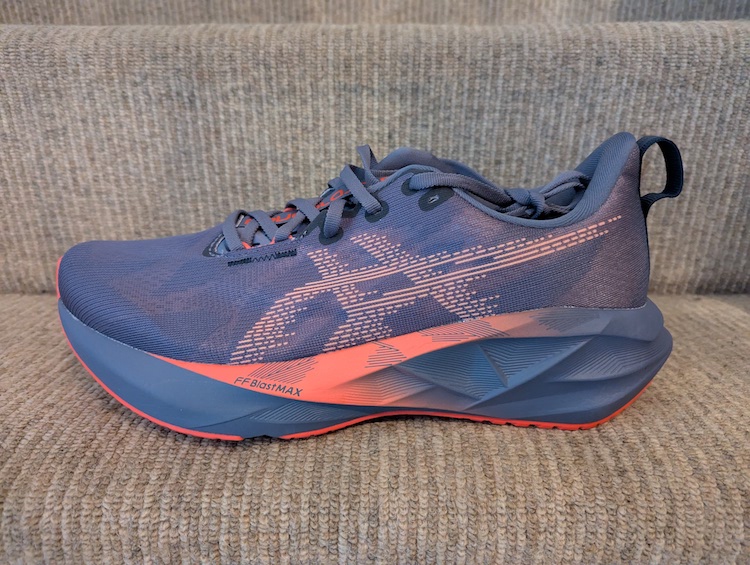
Men’s Fitness verdict
A big improvement on its predecessors, with more responsiveness despite big cushioning. If you like maximal shoes with a softer edge you’ll likely enjoy this shoe.- Big, cushioned comfort
- More responsive ride than the Novablast 3
- A bit on the bulky side
- Sometimes a bit too soft
| Materials | Upper made from at least 75% recycled materials; FF BLAST™ MAX cushioning |
| Sizes | 6 – 15 (US) |
| Weight | 255g / 9oz |
| Colors | 7 available |
The ASICS Novablast 5 maintains its bulky appearance but introduces significant updates. Featuring FlyteFoam BLAST MAX midsole foam with recycled materials, it enhances stability and transitions with a more aggressive rocker. The engineered woven upper offers improved stretch and durability. The shoe’s design now includes higher side walls, an upward-sweeping toe box, and neoprene-like tongue wings for better foot wrap.
Despite a slightly increased weight from the previous model, it remains lighter than competitors like Gel Nimbus 25 and Brooks Ghost Max. Priced at £135 / $140, it maintains its cushioned comfort but feels firmer and more responsive, suitable for various paces. While still bulky, we felt the wider base enhances its stability. Overall, Novablast 5 is an upgrade, appealing to fans of maximal, cushioned shoes with added responsiveness.
- Read our full ASICS Novablast 4 review
6. Hoka Skyward x
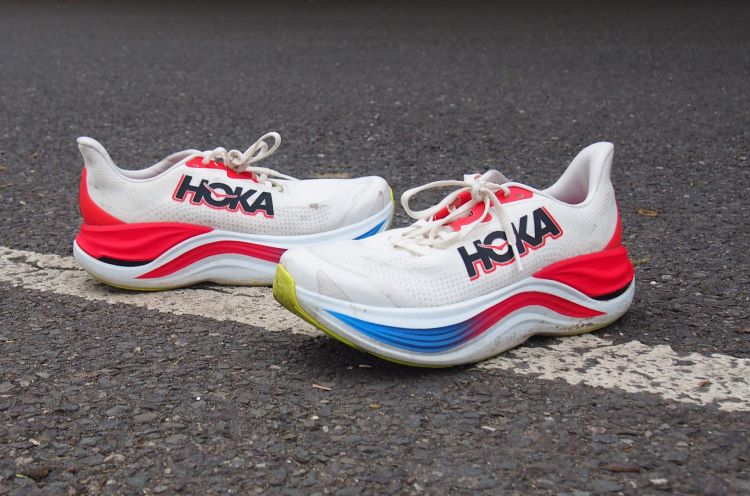
Men’s Fitness verdict
A hulking shoe that prioritises comfort particularly over long distances and lets you cruise at easy to moderate paces in a very smooth and stable fashion.- Accommodating fit and very comfortable
- Surprisingly snappy feel for a big shoe
- Runs lighter than it looks
- Not made for all-out speed
- Heavier than other max cushion super trainers
- It’s not cheap
| Materials | Flat knit mesh upper; dual-density PEBA and EVA midsole foams; carbon fibre plate |
| Weight | 300g / 7.01oz (UK men’s size 8) |
| Colors | Lemonade and sunlight / Blanc de blanc and virtual blue |
| Sizes | 6.5 – 14.5 |
The Skyward X is a whole lot of shoe, putting a big stack of foam between the road and your feet with the goal to protect your legs, particularly when you’re going long. There’s two different foams in play, with a PEBA-based one similar to the type that typically crops up in more low-profile racing shoes to provide big bounce and high rebound. That’s balanced out by Hoka’s EVA-based supercritical foam, which frames the bouncier PEBA to bring a more responsive and stable feel. Sandwiched in between those foams is a carbon plate to help you roll swiftly through your running stride in a more efficient manner to keep those legs feeling fresher.
The Skyward X would be an ideal option if you were looking to do a marathon and wanted to cruise over that distance in something that offers plush, but not overly-plush cushioning. So something that offers a strong level of comfort and protection. It’ll be a satisfying ride from start line to finish line, that’s for sure.
- Read our full Hoka Skyward X review
7. Hoka Cielo X1

Men’s Fitness verdict
The Cielo X1 has a winning combination of light weight, responsiveness and a smooth rolling turnover, with enough cushioning to make anything from fast 5km to marathon distances possible.- Lightweight and fast
- Comfortable and well-cushioned
- Smooth rolling at high speed
- Bulky compared to other carbon racers
- Laces not the most secure
| Materials | Jacquard mesh upper; dual-density PEBA midsole foam; carbon fibre plate |
| Weight | 228g / 8oz |
| Colors | Frost and black / Frost and lava |
| Sizes | 4.5 – 13.5 |
Hoka’s minimalist Cielo X1 carbon race shoe is paired back for a lightweight, responsive ride. With an aggressive rocker shape, breathable knit upper and gusseted knit tongue, its design locks your feet to improve racing speed and control. Its carbon plate is sandwiched between two layers of resilient PEBA foam and the shoe has a stack height of 29mm to 32mm, with a 7mm drop.
With large cutaways and an aggressive rocker, the Cielo X1 has a winning combination of light weight, responsiveness and a smooth rolling turnover, with enough cushioning to make anything from fast 5km to marathon distances possible. It may be expensive but the Hoka Cielo X1 is certainly a worthwhile investment with plenty of race-winning potential.
- Read our full Hoka Cielo X1 review
8. New Balance Fresh Foam X More v4
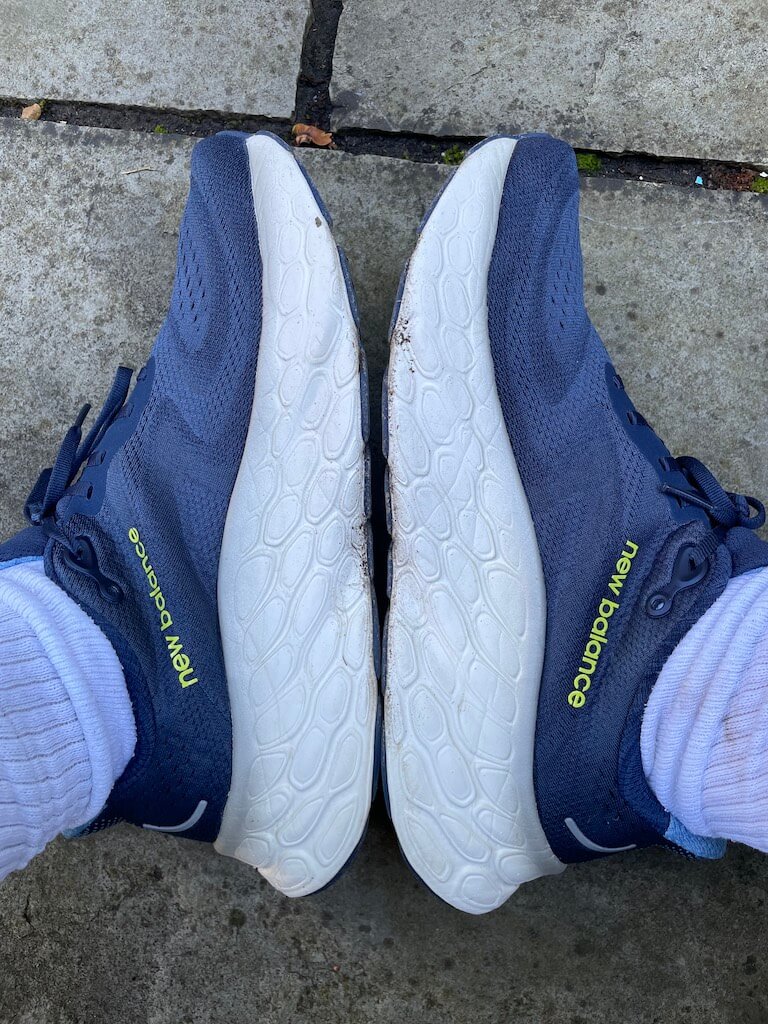
Men’s Fitness verdict
The ultra-cushioned X More v4 ticks all the boxes as a daily mile-eater, but is too big, if not too heavy, for pacier sessions. A great choice for beginners though.- Surprisingly light feel, despite the midfoot cushioning
- Ideal for building up distance while minimising impact on joints
- Heavy cushioning will divide opinion
- Narrow fit may cause rubbing
| Materials | Fresh Foam X midsole; engineered mesh upper (made of 50% or more recycled materials) |
| Sizes | 7-15 (US) |
| Weight | 295g / 10.4oz |
| Colors | Black & phantom / arctic grey & natural indigo / cobalt & black |
The New Balance Fresh Foam X More v4 offers lightweight yet ample cushioning, ideal for entry-level runners aiming to increase their distances while reducing impact-related injuries. However, potential issues arise with its narrow fit and built-up midsole cushioning, causing discomfort and rubbing on the inside of the foot, especially for pronators.
While that may not affect all runners and provides extra protection for some, it obstructs natural gait for others. If you get the fit right and rubbing isn’t an issue, it excels in providing a comfortable ride for slow and steady miles, making it suitable for training sessions but less so for races due to its maximalist cushioning.
- Read our full New Balance Fresh Foam X More v4 review
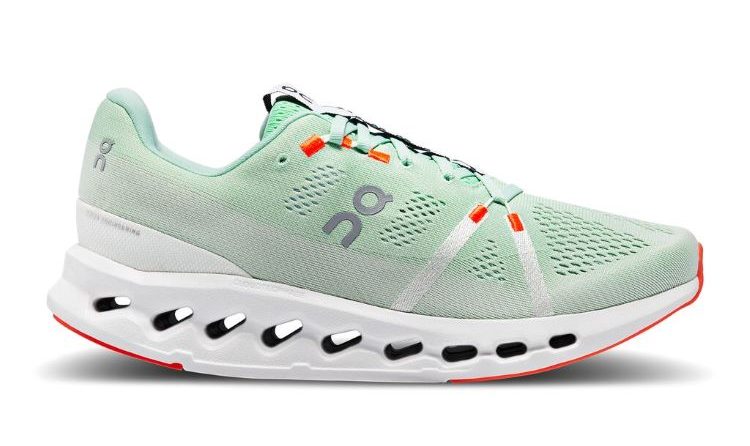
9. On Cloudsurfer 7
Men’s Fitness verdict
The Cloudsurfer 7 is one of those rare beasts: a dedicated daily trainer than can handle harder, faster efforts too. It may be a bit pricier than its peers but that gets you great versatility.- Light and lively
- Great versatility
- Well balanced cushioning
- A bit narrow across the midfoot
- Squeaks when wet
| Materials | Helion™ superfoam midsole; rubber outsole |
| Weight | 238g / 8.4oz |
| Colors | White frost / black / flame white / black cobalt / white sand |
The On Cloudsurfer 7 is a top-tier daily trainer, offering a lightweight, comfortable and well-balanced ride suitable for various training efforts. A notable update lies in its revamped midsole featuring CloudTec Phase technology, which delivers softer landings and springier toe-offs. The shoe boasts a soft dual-layer mesh upper for excellent step-in comfort, although its narrow fit might pose issues for wider feet.
Despite its light weight, it maintains durability and reliable grip with a thin rubber outsole. Weighing 238g / 8.4oz, it competes favorably with similar trainers on the market. We tested it over 30-plus miles on various terrains, and were impressed with its responsive, stable and cushioned ride. Priced at £150 / $160, it offers great value for its versatility, making it suitable for both easy runs and faster efforts, ideal for runners seeking a dependable shoe for all types of training sessions.
- Read our full On Cloudsurfer review

10. Hoka Rocket X 2
Men’s Fitness verdict
Its well-balanced ride makes this a versatile shoe for a range of speeds and distances. That it’s one of the cheapest super shoes going makes the Rocket X 2 even more compelling.- Springy and lively ride
- Good versatility
- Relatively stable for a carbon shoe
- Very tight fit
- Not as propulsive as some rivals
| Materials | Technical synthetic mesh upper; carbon fibre plate |
| Weight | 221g / 7.8oz |
| Colors | Ceramic / evening primrose |
The Hoka Rocket X 2 features a race-ready design with a synthetic mesh upper, gusseted tongue and internal foot cage ensuring a secure fit. However, its narrow fit and tight entry may pose challenges for those with wide feet or high insteps. Once on, though, we felt it offers a comfortable and locked-in feel, providing excellent stability even during tight turns. The zonal outsole rubber reinforcements enhance grip and durability.
It’s one of the lightest carbon shoes, offering a compact, agile and nimble ride reminiscent of early Nike Vaporfly models. With a stack height of 36mm/31mm and a 5mm drop, it provides a subtle yet stable platform for running. We tested it over 50 miles and reckon it excels as a race shoe, offering a balanced, energetic and versatile performance suitable for various paces and distances.
- Read our full Hoka Rocket X 2 review
11. Saucony Hurricane 24
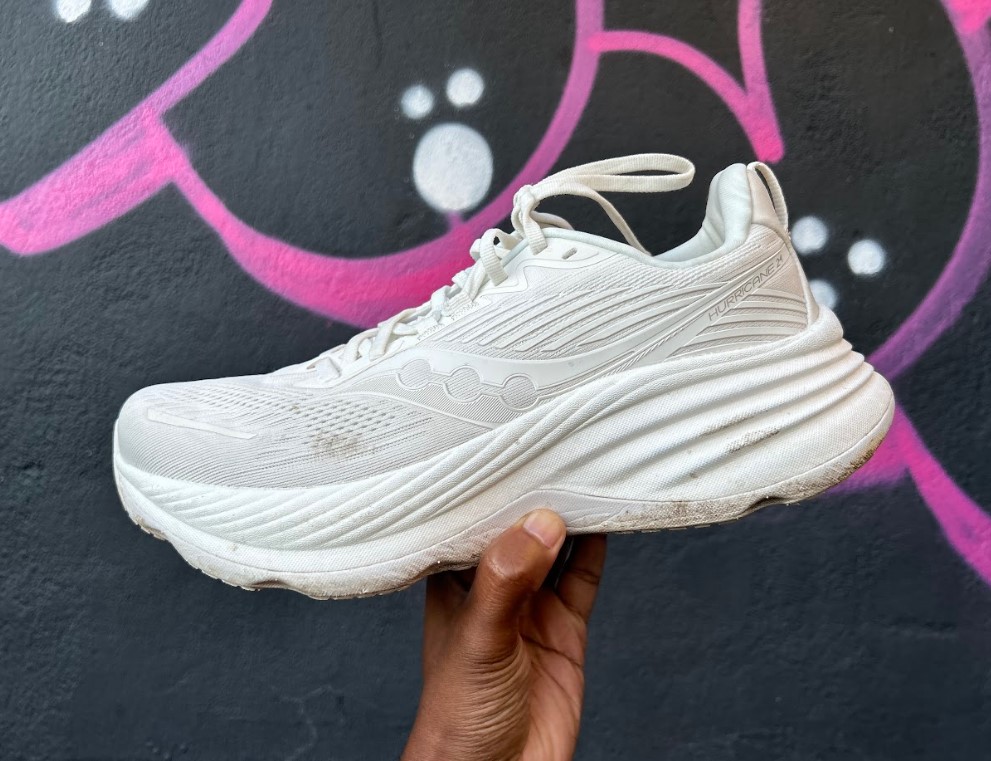
Men’s Fitness verdict
A running shoe that goes big on comfort, making it a great choice for easy running when you’re not chasing times or other runners. That comfort will let you put in big miles too.- Great comfort for easy and recovery runs
- Strong protection over longer runs
- Subtle stability elements
- I’d love it to be a bit lighter
- Not made for faster running
- Takes a few runs to soften up
| Materials | Engineered mesh upper, PWRRUNPB and PWRRUN foam |
| Weight | 316g / 11.1oz (UK men’s size 8) |
| Colors | Black & carbon / black / navy / white / triple white / viziblue |
| Sizes | 6 – 15 |
If you look for plenty of width and support from a running shoe, the Hurricane 24 will be right up your street. Likewise, if you want a shoe for those low-tempo runs, or recovery sessions on tired legs – the Hurricane will have your back there too. Even if you’re not prone to pronation, Saucony’s mile muncher has plenty to offer, in terms of comfort, protection and stability. It’ll keep going the distance, even when you’re not sure your legs will. That combination of PWRRUNPB and PWRRUN foam offers a smooth, balanced ride in a package that we think is as enjoyable as it is durable.
- Read our full Saucony Hurricane 24 review
12. New Balance Fresh Foam X 1080 v14
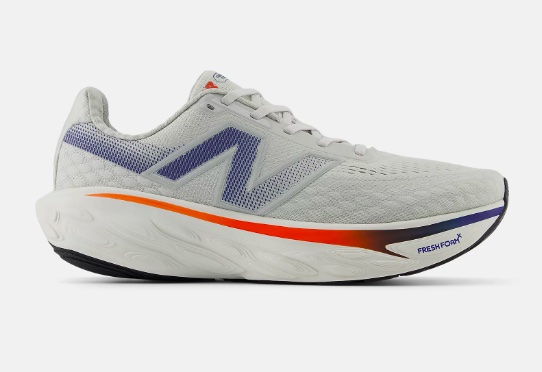
Men’s Fitness verdict
It’s a little beefier and more robust than its predecessor, with more midsole foam, and delivers comfort in spades.- Big, cushioned comfort
- Plush, padded uppers
- Lacks a bit of energy
- Not as versatile as some daily trainers
| Materials | Fresh Foam X midsole; Ndurance rubber outsole |
| Weight | 298g / 10.5oz |
| Colors | Pale moss / grey matter / white / black / black metallic / ink well |
Taking the trademark comfort of New Balance’s 1080 line and dialling it up even further, the Fresh Foam X 1080 v14 is the perfect choice for long, slow runs, in our opinion.
Naturally, the focus on big cushioning means anyone wanting to run light and fast will be better served elsewhere, but for anything at easy, conversational pace, we reckon you won’t find a more comfortable option than this.
Updates from v13 include a triple jacquard mesh upper with increased breathability, a more propulsive outsole and additional rubber in high wear areas.
- Read our full New Balance Fresh Foam X 1080 v13 review
13. Brooks Ghost 16
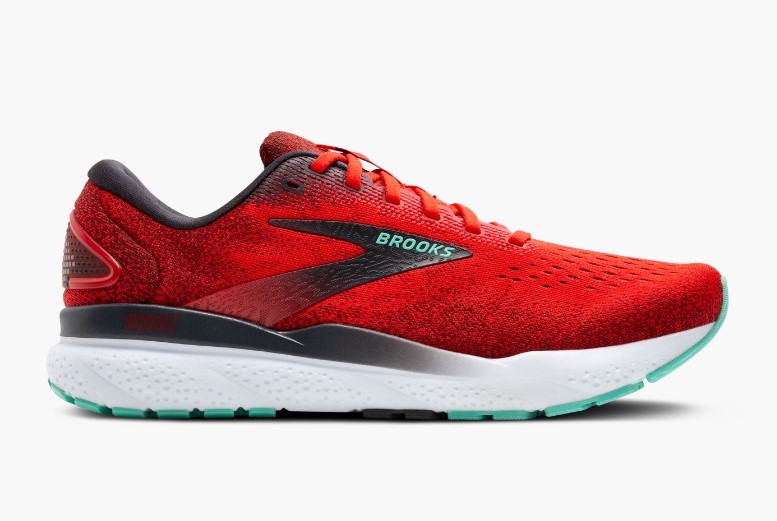
Men’s Fitness verdict
Brooks’ beginner-friendly, workhorse daily trainer gets new foam that makes it more likeable, yet doesn’t stray too far from that Ghost DNA so loyal fans will still want to lace up for daily runs.- Familiar stable and smooth Ghost ride
- New foam offers plusher feeling underfoot
- Can comfortably handle slow to moderate paces
- Toe box feels a touch short
- More versatile alternatives available
- Isn’t much of a looker
| Materials | Engineered mesh upper; nitrogen-infused DNA Loft V3 foam; rubber and silica outsole |
| Weight | 280g / 9.9oz (UK men’s size 8) |
| Sizes | 6 1/2 – 12 1/2 |
| Colors | Six colors available |
The Brooks Ghost is now in its 16th iteration and these latest refinements make it more likeable than ever. The new DNA Loft V3 foam gives more bounce and plushness than its predecessor, which helped us go deeper into big-mile runs.
The Ghost has borrowed the RoadTack outsole tech from its stablemate the Glycerin 21, providing extra traction and promising longevity. Brooks has shaved a little weight of v15 too, creating an all-round better daily shoe for moderate-paced training miles.
- Read our full Brooks Ghost 16 review
14. Saucony Endorphin Pro 4
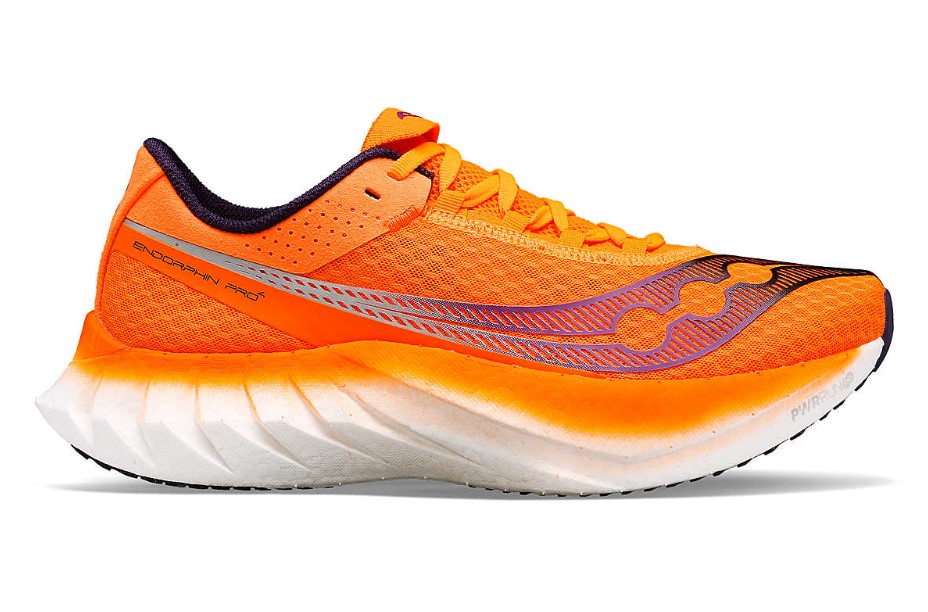
Men’s Fitness verdict
The Pro 4 is an ideal first carbon marathon shoe. It gives you something few carbon shoes offer – great comfort and speed over a range of distances. Only the Elite model pips it to the post.- Soft and comfortable upper
- Impressive energy return
- Good value entry-level carbon shoe
- Blend of comfort and speed makes an ideal first marathon shoe
- There are faster and lighter options available
- Not ideal for shorter races
| Materials | Full carbon plate; PWRRUN PB/HG foam |
| Colors | Black & white / vizi-orange |
| Sizes | 6-14 |
| Heel-toe drop | 8mm (39.5mm/31.5mm) |
| Weight | 212g / 7.5oz |
While the Saucony Endorphin Elite is an out-and-out long-distance race shoe, the similarly carbon-shod Pro 4 has more all-rounder potential. It hits the sweet spot between comfort and speed, with plenty of spring and energy return from the forefoot encouraging a high turnover.
Ultra-thin uppers give your feet plenty of breathability, adding to a respectable weight of just 212g / 7.5oz. If you’re looking for a shoe to encourage you to train for your first marathon, the Endorphin Pro 4 is a good value option we can easily recommend.
- Read our full Saucony Endorphin Pro 4 review
15. inov8 TrailFly G270 V2
Best shoes for trail running
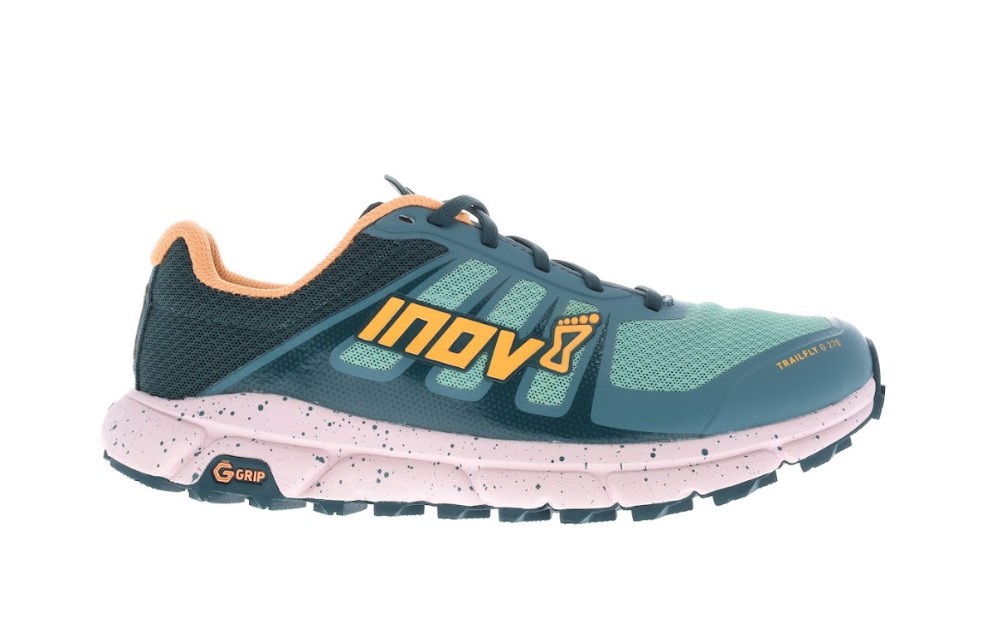
Men’s Fitness verdict
How do you improve an award-winning trail shoe? Do what inov8 has done with its TrailFly G270 V2 and boost fit, comfort and durability while keeping the price competitive.- No-nonsense durability
- Fantastic grip
- Good for road-to-trail transitions
- May be too form for some runners
- Zero drop may not suit everyone
inov8 has improved an already impressive first-gen G270 by enhancing the fit, comfort and durability for this V2 model. All the things that made the G270 a great trail shoe are still here. Graphene-enhanced G-GRIP lugs, PowerFlow Max foam, Boomerang insole and zero-drop design are rolled over from the original. But we’ll testify to the fact that it’s even more agile and responsive than before.
- Read our full inov8 TrailFly G270 V2 review
How we test running shoes
Our testers put each shoe through their paces over a mixture of distances and paces to see where they excel, and clocked up significant distances in each one to examine how they wear over time. Each reviewer focused on speed, stability and comfort during test runs, while also assessing the effectiveness of any high-tech features on offer. Their detailed reviews are sure to help you choose the right running shoe for you.
How to find the right running shoe for you
Every runner’s biochemistry is unique, which means certain shoes will be perfect for some and terrible for others. That said, there are three key things everyone needs to consider when trainer shopping.
- Firstly, the shoe should fit your foot snugly, without having to do the laces up tight.
- Secondly, the shoe should naturally flow with your stride (and make you want to run faster).
- Finally, the shoe should fit your running mechanics, meaning if you start to feel irritation in areas that have bothered you in the past, that’s a sign you’re not wearing the right pair.
When is the best time to run?
A new study from sportsshoes.com has revealed that 7pm on a Sunday – in April or October, to be specific – is the most popular time for smashing PBs. The research looked at the time that 35,000 social media users posted PB photos, using over 15 hashtags relating to personal bests, and cross-referenced the posts with the fitness activities they depicted to reveal the most successful times.
What to look for in the best running shoe, according to the experts
We talked to athletes and coaches about what to consider when buying a pair of running shoes. HYROX master trainer and 247 Represent head coach and athlete Jake Dearden and New Balance athlete and online running coach Jonny Mellor give us their opinions:
How do I make sure I get the correct size?
Jake Dearden: I’d recommend buying half a size up when it comes to running trainers. This is to avoid blisters, especially if your feet swell up on longer runs which is due to the increased blood flow.
Jonny Mellor: A properly fitted running shoe should feel snug in the heel and midfoot, with some room for toe movement. To check proper length when standing you should allow a full thumb width of space between the end of your toes and front of the shoe. This is why often runners are recommended to purchase half a size bigger than a normal every-day shoe. However it’s not always the case, depending on the brand, so it is a good idea to get your feet properly measured by a running specialist store.
What are neutral or supportive shoes? Is more cushioning better?
JD: Neutral shoes are designed for runners with average sized arches and provide a normal amount of support to your foot. Stability shoes are designed for runners with low arches that cause their feet to excessively roll inward with each stride (called ‘overpronation’). I’d suggest getting assessed by a qualified physio and ask them what type of shoe you need. Most of the time you’ll need a neutral shoe paired up with some lower body mobility and stability exercises to improve your running form. More cushion isn’t always better as for some people it can make your stride more inefficient.
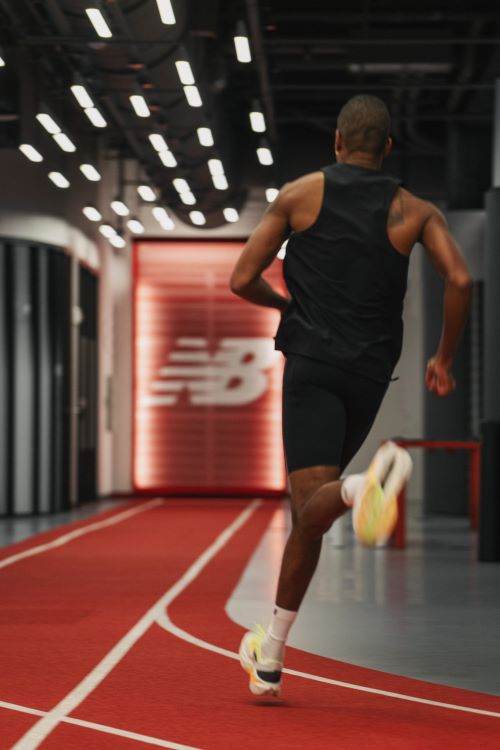
JM: In terms of more cushioning, this will depend on the individual runner and what type of running you’re planning on doing. Some runners prefer a faster, more responsive feel underfoot over more cushioning. This is personally why I love the New Balance 1080 v13 as it feels really soft and cushioned but still feels fast and responsive. If you’re doing lots of miles on the roads or pavement, then you may benefit from a more cushioned running trainer.
Do I need to worry about a shoe’s stack height, drop and weight?
JD: If you are starting out running I wouldn’t worry too much about those features, and try to focus on how your shoe is allowing you to run and if you’re comfortable when doing so. Finding the right pair of running shoes mainly comes down to what you feel most comfortable running in.
However, if you are struggling to find ones that work for you it can be worth looking into those features. Trainers with a bigger stack height are more cushioned, helping absorb the impact from running and therefore being easier on your joints. With a lower heel drop you are encouraging a more natural running pattern as it is closer to you being barefoot, the most natural gait form, which will promote midfoot landing as opposed to heel striking which is a more inefficient running technique. If you struggle with knee pain, lower heel drop shoes are often more comfortable and vice versa if you struggle with Achilles issues.
The weight of a shoe is important if you are focusing on speed work. I would always focus on technique and your running form and the other elements of a shoe that allow you to be as efficient as possible before looking into shoe weight.
JM: Again, this will come down to personal preference and what you’ve ran in previously and feel most comfortable running in. It will also depend on your running style, history of injuries and what surface you plan on running on. Runners traditionally go for a lighter shoe for race day or interval work to feel faster and more responsive.
Trail shoes vs road shoes: what’s the difference?
You’ll need a different kind of shoe depending on where you run. Off-road or trail shoes are made to be more robust than road shoes, and tend to be heavier. But the basic differences are three-fold. Firstly, trail shoes offer more lateral support while road shoes will have more vertical cushioning. Secondly, trail shoes tend to offer more ground feel and feedback – useful for traversing changing and unpredictable terrain. Thirdly, they also have lugs or grips on the outsole to offer traction over wet or slippery surfaces. Road shoes will be more minimal in that regard.
Are heavily cushioned shoes bad for you?
There’s no denying that heavily cushioned shoes can reduce the rate at which impact is absorbed. That’s especially useful for those new to running or lacking endurance running experience.
But over time, an excessive reliance on cushioning may affect your running gait, whereas thinner-soled shoes tend to promote a more natural stride.
Basically, shoes that are too soft may alter natural running biomechanics, reducing sensory feedback from the ground.
How to recycle old running shoes
If they’re starting to wear out, it’s worth considering how to recycle your old running shoes. Breaking free from the myth of mandatory replacement after 500 miles and embracing initiatives like JogOn (which collects unwanted running shoes for redistribution) may significantly reduce the environmental impact your sports gear has on the planet – and mean your old running shoes find a new purpose beyond the landfill. Another option is to go for running shoes that are made from 100% recycled materials. On and Vivobarefoot, for example, offer a number of options.
Related content:



